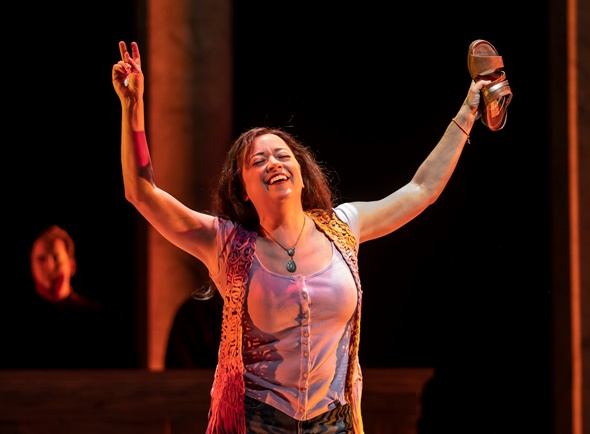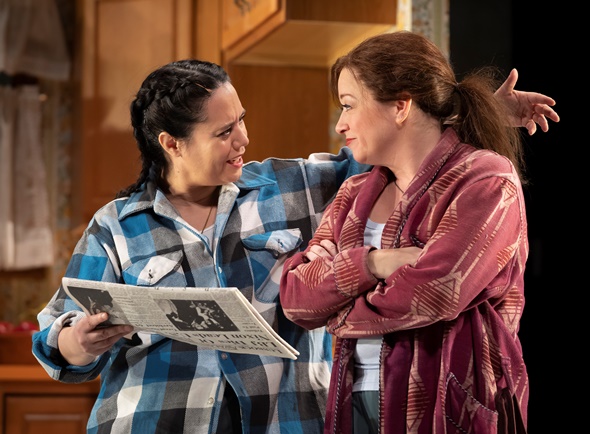‘Roe’ at Goodman: Politics of abortion made
all too simple – and leavened with laughter

Kate Middleton plays Norma McCorvey, the woman known in the famous Supreme Court abortion case simply as Roe, in Lisa Loomer’s play at Court Theatre. (Liz Lauren photos)
Review: “Roe” by Lisa Loomer, at Goodman Theatre through Feb. 23. ★★
By Lawrence B. Johnson
Political theater comes in all shapes and wrappers, but mostly it’s a genre of righteous harangue. Setting aside the not untenable argument that all theater is political, egregiously agenda-driven drama tends to be heavy handed, obvious and dull. The play in immediate view, Lisa Loomer’s “Roe,” on the boards at Goodman Theatre, offers the dubious amusement of a cartoon: over-drawn, simplistic and, alas, laughable.

Sarah Weddington (Christina Hall) is the relatively inexperienced lawyer who represents Roe before the Supreme Court.
Premiered in 2016, “Roe” revisits the great social and political battleground that was “Roe v. Wade,” the 1973 test case that went before the Supreme Court to decide the legality of abortion – whether, in ethical and indeed Constitutional terms, a woman had the right to decide about matters pertaining to her own body. Loomer’s play endeavors to give a human face and human foibles to the woman at the center of that debate, a person known at the time only as “Jane Roe” – and to recreate the process, tumult and aftermath of what remains a hotly contested victory for pro-choice.
From the get-go, the playwright paints her portraits, especially the raw persona of Norma McCorvey, the real-life Jane Doe, with quite a broad brush. In any case, director Vanessa Stalling and actress Kate Middleton represent McCorvey as a hell-bent lowlife, a foul-mouthed, beer-swilling deplorable whose primary purpose in life is to shock and offend her known world (not a very wide sphere) and the viewer as well. She’s a sad young woman, and good for laughs.
Enter the fledgling lawyer Sarah Weddington (Christina Hall in a turn of measured credibility and depth), who willy-nilly ends up fronting the case before the Supreme Court. Though McCorvey (anonymous as Jane Roe) is the nominal plaintiff, she’s really just the poster figure for the bigger issue of abortion. We shall get to that most hallowed hall of justice, but first Norma McCorvey at street level. Make that mean streets.

After a grocery clerk (Stephanie Díaz, left) cuts the hungry Norma McCorvey (Kate Middletone) a break, their two lives grow intertwined.
We learn that little Norma was abused by a brutish mother (whom we meet for confirmation) and that from an early age she lived a feral existence, adrift in the world, at once emerging as a lesbian and becoming pregnant a few times. It is her latest unwanted pregnancy that qualifies her as the figurehead for a great push to overturn laws generally prohibiting abortion.
McCorvey is, or at any rate should be, a sympathetic character. But we’re into caricature here, and it’s hard to know whether to lay blame for Middleton’s unsubtle, uninflected portrayal at her feet or upon the desk of director Stallings. There is a deep breath of plausibility, of real empathy, when the penurious McCorvey tries to steal food from a shop only to be caught out by the cashier, who will become the troubled young woman’s partner and soulmate. Stephanie Díaz gives perhaps the strongest, most nuanced performance in the show as that kindly clerk, who becomes McCorvey’s long-suffering partner.
This parade of disappointments eventually reaches the Supreme Court, but the playwright doesn’t really engage arguments before the high justices. We get little more than declamatory one-liners on behalf of Roe, answered by as many buffoonish quips from the knuckle-dragging lawyer representing the state of Texas. If the legal advocate for pro-choice suggests Joan of Arc, the big dope on the other side couldn’t make it as a court jester. Meanwhile, we never do hear a gritty confrontation, anything close to philosophical, moral or legal debate.
Ultimately, Roe – her true identity at last revealed to the world – gets her spiritual comeuppance in the person of a preacher called Flip. He has turned away from his former dissolute life to become a rescuer of souls. Flip (Ryan Kitley in a personable and zealous performance) is ardently pro-life as well as anti-gay. He equates homosexuality with what he sees as fetus-murder: a choice, and a bad one. Flip, glib and manipulative, takes the impressionable and emotionally needy Norma McCorvey under his wing. If McCorvey’s progression is plausible enough, its course grows tediously long.
Designer Collette Pollard’s huge Supreme Court set matches in scope both the historical moment and the still heated wrangling over abortion. Would that the play summoned that gravitas in more compelling measure.
Related Link:
- Performance location, dates and times: Details at TheatreInChicago.com


